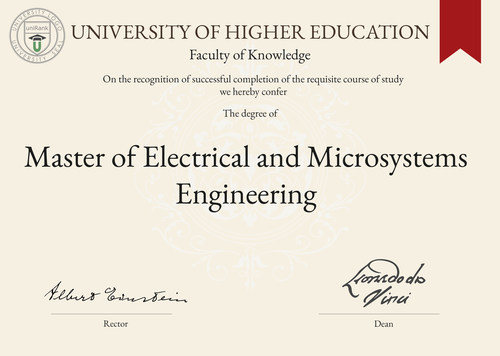
Master of Electrical and Microsystems Engineering (M.E.M.E.)
Guide to Master of Electrical and Microsystems Engineering Program/Course/Degree
Master of Electrical and Microsystems Engineering (M.E.M.E.)

Program Name:
Master of Electrical and Microsystems EngineeringProgram or Degree abbreviation:
M.E.M.E.Duration range:
Typically 1.5 to 2 yearsTuition range:
Varies depending on the country and university, ranging from $10,000 to $30,000 per yearOverview:
The Master of Electrical and Microsystems Engineering program is designed to provide students with advanced knowledge and skills in the field of electrical engineering and microsystems. It focuses on the study of electrical systems, microelectronics and the development of microsystems for various applications.Curriculum Overview by year:
The curriculum is typically divided into coursework and research components. In the first year, students take core courses in electrical engineering principles, microelectronics and microsystems design. In the second year, students have the opportunity to specialize in areas such as power systems, telecommunications, or nanotechnology through elective courses. They also undertake a research project or thesis.Key Components:
The key components of the program include advanced coursework in electrical engineering, microelectronics and microsystems design. Students also gain practical experience through laboratory work and research projects. The program emphasizes the development of critical thinking, problem-solving and communication skills.Career Prospects:
Graduates of the Master of Electrical and Microsystems Engineering program can pursue careers in various industries, including electronics, telecommunications, power systems and microsystems development. They can work as electrical engineers, microsystems engineers, research scientists, or consultants in both the private and public sectors.Salary Expectations:
Salary expectations for graduates of this program can vary depending on factors such as the country, industry and level of experience. On average, electrical engineers with a master's degree can earn a salary ranging from $70,000 to $100,000 per year.Conclusions:
It is important to note that the duration, tuition fees, curriculum, key components, career prospects and salary expectations of the Master of Electrical and Microsystems Engineering program can vary depending on the chosen country or location of study, as well as the chosen university. Prospective students are advised to research and compare different programs and universities to find the best fit for their goals and aspirations. Visitors can search for where this specific degree, M.E.M.E., is offered anywhere in the world through the uniRank World Universities Search Engine.World Universities Search Engine
search for Master of Electrical and Microsystems Engineering (M.E.M.E.) and add the Location (country, state etc.) or specific University you are interested in studying at.
Query examples:
- Master of Electrical and Microsystems Engineering (M.E.M.E.) United States
- Master of Electrical and Microsystems Engineering (M.E.M.E.) United Kingdom online
- Master of Electrical and Microsystems Engineering (M.E.M.E.) Australia international students
- Master of Electrical and Microsystems Engineering (M.E.M.E.) University of California
- Master of Electrical and Microsystems Engineering (M.E.M.E.) University of London tuition fees
- Master of Electrical and Microsystems Engineering (M.E.M.E.) University of Sydney scholarships
Share Program/Course
Interesting? Share this program/course/degree info with your friends now.